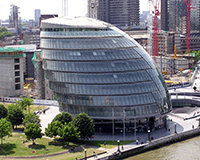 Making sure people can get to their offices and their jobs should be top of the new mayor’s in-tray on May 6, according to Nick Lansman, managing director of public affairs consultancy Political Intelligence.
Making sure people can get to their offices and their jobs should be top of the new mayor’s in-tray on May 6, according to Nick Lansman, managing director of public affairs consultancy Political Intelligence.
“The mayor needs to ensure that London can continue to function as a city, so not just transport infrastructure, but energy supply and digital utilities,” he said. “There is a misunderstanding that digital connectivity problems only apply to rural areas. While provision in London is good, there are certainly inner city notspots.”
Closing the skills gaps should also be a priority, says Lansman: “They need to maintain London’s access to people with the right skills, especially in the tech sector.”
But whatever policy decisions and strategies the new mayor eventually drives forward, Lansman suggests that they need to do it in a different way, shaking off the short-termism of the past and putting in place investment plans that span decades. “Brave political decisions will have to be made,” he suggests. “That may not be in the personal interest of that individual.”
What do other members of the London Forum think?
 John Slade, chief executive, BNP Paribas Real Estate
John Slade, chief executive, BNP Paribas Real Estate
“The next mayor’s priority should be to strengthen and protect the capital’s role as the leading global city for business. This means addressing two overriding issues: housing and job creation. Job creation is no less crucial. Despite its prosperity, London’s unemployment rate is one of the highest in the UK and it lags other global cities in GDP per head.
“Training needs greater direction to ensure it is better matched to employers’ needs, while greater investment in infrastructure, particularly digital connectivity, is needed to future-proof the city and ensure jobs stay in the capital.
“The mayor must also energise London’s voice on the national stage on issues that could put its status as a global capital at risk, and take a greater ambassadorial role internationally, developing links and winning business from emerging markets, particularly in Asia.”
 Simon Cookson, real estate partner,
Simon Cookson, real estate partner,
DLA Piper
“London’s chronic housing shortage is the biggest issue facing the mayor in his first six months. Action on multiple fronts is needed. The incumbent will have to work collaboratively with government to ensure the public and private sectors work better together to make the London market affordable in the middle. The mayor could also look to work closely with local housing companies and make relevant adjustments in town and country planning law to ease the cost of constructing housing in London.”
 Nick Belsten, director, Indigo Planning
Nick Belsten, director, Indigo Planning
“Transport and housing affordability are the two interlinked areas that most affect Londoners and where the new mayor can make most difference. He or she needs to put their full force behind ensuring planning authorities are properly resourced and speeding up the release of public sector land through the London Land Commission to get new sites into circulation for housing.
“At the same time, we need more devolution. The mayor should have extra powers and greater fiscal responsibility – including around business rates – to make headway with these issues in future. These fixes need to be put in place while continuing the current mayor’s pro-business stance and support for London as a major financial centre. Sustainable economic growth is key.”
 Bill Hughes, head of real assets, Legal & General Investment Management
Bill Hughes, head of real assets, Legal & General Investment Management
“Housing and transport infrastructure are most important. An obligation for build to rent as part of each local authority’s housing strategy would be a good place to start. Mobile labour is often the best labour and to jeopardise London’s potential by restricting its workforce access to flexible, yet well-managed, accommodation risks depressing future growth.
“London is making progress with transport infrastructure and we are excited by the arrival of Crossrail 1 from 2018. However, London needs more. What investors need, and a mayor could help provide, is certainty on routes, timings and funding requirements, and consistency and clarity on the bidding process.”
 Jo Valentine, chief executive, London First
Jo Valentine, chief executive, London First
“Top of the inbox for the new mayor will be addressing the scale of the capital’s housing crisis: 73% of businesses already think London’s housing supply and costs are a significant risk to the capital’s economic growth.
“Next is an issue that is rising in urgency: congestion on London’s roads. Traffic volumes are rising, and both planned and unplanned interventions that stop traffic are increasing. In the first six months, the mayor needs to develop a more radical plan for increasing road capacity and reducing congestion. This should address issues such as where new tunnels and bridges are feasible, how more freight deliveries can be enabled to take place outside peak hours as well as the role a more sophisticated congestion charge could play.”
 David Waterhouse, associate director of strategic development, Design Council
David Waterhouse, associate director of strategic development, Design Council
“Here is a plea for well-designed, spacious and affordable housing of two or three tenures that can be easily understood by all in the capital, not least by those who are in desperate need of being housed. If the new mayor can communicate this crisply and clearly then it will surely be easier to get building the homes we all desperately need.
“London does not operate in splendid isolation and is part of a wider hinterland. It therefore needs to have a clear strategy and vision to take forward the Outer London Commission and work much more closely with adjoining authorities.”











